Modern Philosophy Research Library (69 vols.)
Digital Logos Edition
Overview
Get access to Logos’ smart features. Logos research libraries combine premier scholarly tools with interconnected digital libraries, tools, and media. Join the discourse on the nature of knowledge, language, and reality itself with Logos’ Modern Philosophy Research Library. Originating in Western Europe in the seventeenth century, modern philosophy left a lasting impact on Western society. Enhance your study of Descartes, Kant, Hegel, and more with 69 intelligent texts and Logos’ smart research tools—a library worth nearly $1,600.
Get an even better deal—the Humanities Research Library (including the Perseus Classics Collection)!
This title is included in the following collections
You can save when you purchase this product as part of a collection.
Philosophy Research Library (1...
$799.99$799.99

Logos lets you study classic texts from across the centuries with unparalleled depth and efficiency. Primary texts and translations scroll in sync and side by side. Greek and Latin gloss and morphology appear with a single click. Notes and highlights sync across all of your devices. Quickly access information on difficult or unusual words, and get instant definitions, translations, and more. Discover new connections with Logos’ Timeline feature. Use Logos Groups to collaborate and share insights with others. With original-language data, cross-references, and rich media, Logos gives you an unparalleled experience and the academic advantage.
- The Method, Meditations, and Philosophy of Descartes
- Select Works of John Locke (3 vols.)
- Select Works of Baruch Spinoza
- Discourse on Metaphysics, Correspondence with Arnauld, and Monadology by Gottfried Wilhelm von Leibniz
- Select Works of George Berkeley (2 vols.)
- Select Works of David Hume (4 vols.)
- Jean-Jacques Rousseau Collection (5 vols.)
- Immanuel Kant Collection (6 vols.)
- Friedrich Schleiermacher Collection (6 vols.)
- Works of Hegel (13 vols.)
- Hegel’s Lectures on the Philosophy of Religion (3 vols.)
- Select Works of William James (8 vols.)
- Select Works of John Dewey (11 vols.)
- Tractatus Logico-Philosophicus (2 vols.) by Ludwig Wittgenstein
- Concise Oxford English Dictionary, 11th Edition edited by Catherine Soanes and Angus Stevenson
- Noet Philosophy Presentation Media
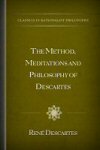
The Method, Meditations, and Philosophy of Descartes
- Author: René Descartes
- Translator: John Vietch
- Publisher: M. Walter Dunne
- Publication Date: 1901
- Pages: 371
The Method, Meditations, and Philosophy of Descartes contains three of Descartes most important works: Discourse on the Method, Meditations, and selections from Principles of Philosophy. Together, these three books make up the core of Cartesian epistemology. In the Discourse on the Method, Descartes lays out his method for acquiring knowledge by way of an autobiographical sketch of his own intellectual development. In Meditations, Descartes structures his method for arriving at certain knowledge in the form of six meditations that take place over six days. In Principles of Philosophy, Descartes gives a thorough summary of his philosophical system and shows how that philosophy is the basis for his scientific system.
René Descartes (1596–1650) was born in La Haye en Touraine, Indre-et-Loire, France. He was a mathematician, philosopher, and writer. He is known both as the father of modern philosophy and as the father of analytical geometry. He is best known for his statement “cogito ergo sum” or “I think, therefore, I am.”
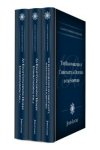
Select Works of John Locke
- Volumes: 3
- Pages: 1,461
John Locke is credited as one of the founders of British empiricism. He taught, contrary to Continental rationalism, that humans cannot have a priori knowledge. In other words, the only sure knowledge that humans can have is based on experience. One must experience—observe, interact with—in order to know. He believed that the human mind was blank (tabula rasa) at the beginning of life. One’s experiences “wrote” on this blank paper, creating knowledge. Locke’s theory of knowing (epistemology) is considered by some philosophers to contain the seed of the Western concept of self.
Individual Titles:
- An Essay concerning Human Understanding, vol. 1
- An Essay concerning Human Understanding, vol. 2
- The Reasonableness of Christianity, as Delivered in the Scriptures
John Locke (1632–1704) was born in Wrington, Somerset, to a Puritan family. He attended Christ Church, Oxford, where he earned a BA, an MA, and a Bachelor of Medicine. After studying medicine, he met the Earl of Shaftesbury and became involved in Shaftesbury’s Whig movement. In 1683, he fled to the Netherlands to escape prosecution over his supposed involvement in the Rye House Plot. Most of his published works were written while he was in exile in the Netherlands. He returned to England and continued to work with the Whig party until his death in 1704.
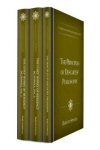
Select Works of Baruch Spinoza
- Volumes: 3
- Pages: 984
Get to know one of the great rationalists of the seventeenth century. Referred to as “the prince of philosophers” by French philosopher Gilles Deleuze, Baruch Spinoza has left a lasting impact on the fields of ethics, biblical criticism, and literature.
The rationalist philosophers argued that knowledge does not come primarily through the senses, but through reason. The mind, they argued, contains innate ideas. These innate ideas are the foundation for, and structure of, knowledge. In order to attain truth, one must apply reason to these innate ideas. Consequently, one does not need direct experience of reality to achieve knowledge. Behind this theory was the belief in a common substance out of which all things are formed. Since the rationalist mind is also made from this substance, it shares the same basic structure. It is this shared structure that allows the mind to acquire knowledge of everything else.
Individual Titles:
- The Principles of Descartes’ Philosophy translated by Halbert Hains Britan
- The Chief Works of Benedict de Spinoza, vol. 1 translated by R.H.M. Elwes
- The Chief Works of Benedict de Spinoza, vol. 2 translated by R.H.M. Elwes
Baruch Spinoza (1632–1677) was born in the Jodenbuurt in Amsterdam, Netherlands. His philosophy laid the foundation for the eighteenth century Enlightenment and modern biblical criticism.
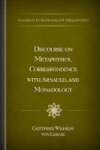
Discourse on Metaphysics, Correspondence with Arnauld, and Monadology
- Author: Gottfried Wilhelm von Leibniz
- Translator: George R. Montgomery
- Publisher: The Open Court Publishing Company
- Publication Date: 1902
- Pages: 272
Discourse on Metaphysics, Correspondence with Arnauld, and Monadology contains Gottfried Wilhelm von Leibniz’s most important philosophical works. In Discourse on Metaphysics, Leibniz looks at the nature of physical substance, motion, and God’s place in the universe. He argues that God is an absolutely perfect being; that, while God is good, goodness and God are separate things; and that, all things considered, God created the best world possible. The correspondence with Arnauld is a series of letters between Leibniz and the French Roman Catholic theologian Antoine Arnauld, discussing similar topics as Discourse. In Monadology, Leibniz attacks the Cartesian assertion that mind and body are two separate substances that communicate with each other. Leibniz argued that the whole universe is made of many little substances called monads. The monads are programmed to act in certain ways, and the actions of each monad are coordinated with the actions of all the other monads. This gives the impression of communication between substances when actually it is just a pre-established harmony.
Gottfried Wilhelm von Leibniz (1646–1716) was born in Leipzig, Saxony, at the end of the Thirty Years War. His father was a professor of moral philosophy at the University of Leipzig. Leibniz attended the University of Leipzig when he was 15. He earned a BA in philosophy in 1662, at the age of 16, and a master’s in philosophy two years later. The following year, 1665, Leibniz earned a BA in law from the university. He published his first book at the age of 20. At 21, he applied for a doctoral program in law at the University of Leipzig and was denied. He left Leipzig and enrolled in the University of Altdorf, where he earned a doctorate in law in 1666.
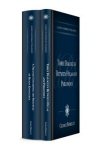
Select Works of George Berkeley
- Volumes: 2
- Pages: 560
Berkeley’s brand of empiricism is known as immaterialism (sometimes subjective idealism). Berkeley taught that matter, as an abstract entity, had no existence on its own. Rather, said Berkeley, objects only exist if they are perceived. An apple, for example, is made up of a number of different qualities (color, smell, taste, etc.). If there is no mind to perceive those qualities, taught Berkeley, the apple would not exist. His motto, “to be is to be perceived,” sums up this philosophy. Berkeley’s empiricism supports the Lockean idea that knowledge relies on observation. It departs from Locke in denying the existence of matter as an abstract entity.
Individual Titles:
- A Treatise concerning the Principles of Human Knowledge edited by Charles P. Krauth
- Three Dialogues between Hylas and Philonous edited by Thomas J. McCormack
Bishop George Berkeley (1685–1753) was born in Thomastown, County Killkenny, Ireland, and attended Trinity College in Dublin. He earned an MA in 1707 and a doctorate in divinity in 1721. He taught Greek, Hebrew, and divinity at Trinity College until 1724, when he was appointed Dean of Derry in the Church of Ireland. In 1728, he moved to Rhode Island with the hopes of starting a college in Bermuda. Funds for the new college did not arrive as expected, and Berkeley was forced to return to London. While in London, he worked at the Foundling Hospital and helped establish a home for abandoned children. He was appointed Bishop of Cloyne in 1734, living there until he retired in 1752.
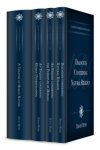
Select Works of David Hume
- Volumes: 4
- Pages: 1,336
What is the nature of knowledge? David Hume answered this question by arguing that humans can derive knowledge only from sense experience. Known as empiricism (from the Greek empeiria meaning “experience”), Hume’s way of understanding knowledge revolutionized Western philosophy.
Individual Titles:
- A Treatise of Human Nature edited by L.A. Selby-Bigge
- An Enquiry concerning Human Understanding
- An Enquiry concerning the Principles of Morals
- Dialogues concerning Natural Religion edited by Bruce M’Ewen
David Hume (1711–1776) was born in Berwickshire, near Edinburgh, in Scotland. Hume was a philosopher, historian, economist, and essayist. He attended the University of Edinburgh from the age of 11 but left at 15 to pursue private study. His skepticism concerning religion kept him from getting the Chair of Ethics and Pnuematical Philosophy at the University of Edinburgh. When he failed to get the position, he accompanied his cousin as a secretary on a military mission against the French in Canada. After his trip to Canada, Hume travelled with his cousin to Vienna and Turin. He wrote at least one important philosophical treatise during this trip. When he returned to Scotland he accepted a position as a librarian and completed the six-volume History of England, which became a best seller. Hume lived in Paris as secretary to the British ambassador to France for three years. A fleeing Jean-Jacques Rousseau accompanied Hume on his return trip to England. Hume lived in London for a year, serving as under-secretary of state. Returning to Edinburgh, he built a house where he remained for the rest of his life.
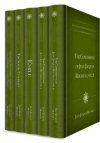
Jean-Jacques Rousseau Collection
- Author: Jean-Jacques Rousseau
- Volumes: 5
- Pages: 1,605
Jean-Jacques Rousseau stands in the middle of the eighteenth-century shift from the Enlightenment to Romanticism in the eighteenth century. His The Social Contract and A Discourse upon the Origin and Foundation of the Inequality among Mankind had a major influence on the leaders of the French Revolution. He was a friend of Enlightenment thinkers like Diderot, and a contributor to the great Enlightenment project, Encyclopedie. Yet Rousseau’s work is often at odds with the strict scientific rationalism of many Enlightenment thinkers. Rousseau encourages emotional expression and emphasizes the importance of freedom in educational development.
Individual Titles:
- A Discourse upon the Origin and Foundation of the Inequality among Mankind translated by G.D.H. Cole
- The Social Contract translated by G.D.H. Cole
- Émile, or Treatise on Education translated by William H. Payne
- The Confessions of Jean-Jacques Rousseau, vol. 1
- The Confessions of Jean-Jacques Rousseau, vol. 2
Jean-Jacques Rousseau (1712–1778) was born in Geneva to a middle class Protestant family. In 1728, Rousseau moved to Annecy, in France. While there, Rousseau converted to Roman Catholicism at the encouragement of Louise de Warens. In recanting his Calvinism, Rousseau was also giving up his Genevan citizenship. Rousseau moved to Paris in 1742 and developed relationships with the Enlightenment philosophes Diderot and Condillac. Rousseau contributed an article on music to Diderot and d’Alembert’s Encyclopedie. He left Paris for three years to serve at the French Embassy in Venice. When he returned to Paris, he met his future wife, Therese Levasseur, with whom he had five children (all of whom were left at the orphanage). Rousseau eventually left Paris, lived for a time in the French countryside, moved in with the Duke of Luxemburg, and eventually returned to Switzerland. At the invitation of David Hume, Rousseau went to England. After a falling out with Hume, Rousseau returned to France, where he spent the rest of his life. In addition to his works of philosophy, Rousseau wrote seven operas, an autobiography, and a work of fiction. He is credited as one of the first thinkers of the Romantic movement.
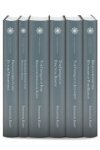
Immanuel Kant Collection
- Author: Immanuel Kant
- Volumes: 6
- Pages: 2,283
Known by many as the most influential philosopher since the Greeks, Immanuel Kant has had a vast influence on modern philosophy. Drawing on both the empiricists and the rationalists, Kant argued that humans gain knowledge of the external world though experience. However, he said, innate concepts in human reason shape that knowledge, giving it structure and form. He argued that conceptual knowledge and sensible knowledge must be understood as separate categories.
Individual Titles:
- Prolegomena to Any Future Metaphysics translated by Paul Carus
- Fundamental Principles of the Metaphysic of Ethics translated by Thomas Kingsmill Abbott
- The Critique of Pure Reason translated by F. Max Müller
- The Critique of Practical Reason translated by Thomas Kingsmill Abbott
- The Critique of Judgment translated by J.H. Bernard
- Religion within the Boundary of Pure Reason translated by J.W. Semple
Immanuel Kant (1724–1804) was born in Königsberg, Prussia, in a Pietist Lutheran family. He attended the University of Königsberg, becoming a lecturer there after graduation. In 1770, he accepted the chair of logic and metaphysics at Königsberg. He published and taught a variety of subjects, but focused on metaphysics and its relationship to physics and mathematics. He was heavily influenced by the writings of Leibniz, Newton, Hume, and Rousseau, drawing on both the empiricist and the rationalist schools. He wrote works of metaphysics, epistemology, ethics, aesthetics, and teleology. His revolutionary contribution to philosophy is his argument that human knowledge of the world comes from sense experience but is shaped by innate structures inherent in human reason.
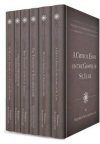
Friedrich Schleiermacher Collection
- Author: Friedrich Schleiermacher
- Volumes: 6
- Pages: 1,856
What is the foundation of liberal Protestantism? Wracked by doubt and challenged by questions raised by the Enlightenment, Friedrich Schleiermacher attempted to develop a system of theology that would free theology from shifts in philosophy. What he created was a theological system that replaced Scripture and the historical creeds with human experience and emotion. Schleiermacher, known as the Father of Liberal Theology, argued that the “essence of religion is the feeling of absolute dependence.” Jesus was unique, he said, because he was keenly aware of this utter dependence. It is the church’s job to live this utter dependence and communicate it with the world. The work of theology is to explore the experiences and feelings of living out this utter dependence. Theology, for Schleiermacher, should be descriptive, not prescriptive.
Individual Titles:
- On Religion: Speeches to Its Cultured Despisers translated by John Oman
- Christmas Eve: A Dialogue on the Celebration of Christmas translated by W. Hastie
- Brief Outline of the Study of Theology translated by William Farrer
- The Theology of Schleiermacher: A Condensed Presentation of His Chief Work “The Christian Faith” translated by George Cross
- Selected Sermons of Schleiermacher translated by Mary F. Wilson
- A Critical Essay on the Gospel of St. Luke
Friedrich Schleiermacher (1768–1834) was born in Breslau, Silesia, Prussia. His father was a Reformed chaplain in the Prussian army. Schleiermacher attended a Moravian school and eventually went to the University of Halle. He graduated from Halle in 1794 and began to tutor the children of an aristocratic family. He left after two years and took up a chaplaincy at a hospital in Berlin. While in Berlin, Schleiermacher was influenced by the Romantic movement, particularly the emphasis on imagination and emotion. He read the works of Baruch Spinoza, Plato, Immanuel Kant, Fichte, and Schelling. In 1802, he became the pastor of a congregation in Stolp, Pomerania. He left in 1804 to accept a position as preacher and professor of theology at the University of Halle. In 1807, he accepted an offer to become pastor of Trinity Church in Berlin. While there, he helped found the University of Berlin and accepted a chair of theology. He also became the secretary of the Prussian Academy of Sciences. Schleiermacher’s advocacy of the unification of the Reformed and Lutheran branches of the German church led to the Prussian Union of Churches in 1817. Schleiermacher wrote his magnum opus, Der christliche Glaube nach den Grundsätzen der evangelischen Kirche (The Christian Faith according to the Principles of the Protestant Church), in 1821 and revised it in 1831.

Works of Hegel
- Volumes: 13
- Pages: 5,314
Hegel’s impact on western philosophy can be seen as much in those who disagree with him as in those who agree. Karl Marx, an enthusiastic student of Hegel’s works, developed his economic theory based on Hegel’s dialectic understanding of reality. Kierkegaard’s existentialism owes as much to Hegel as it does to Kierkegaard’s rejection of him. Feuerbach, too, had strong affinities and objections to Hegel’s ideas. Whether you agree or disagree with Hegel, he is a force to be reckoned with, and his works are a necessity in any philosophical library.
Individual Titles:
- Phänomenologie des Geistes edited by Georg Lasson
- Phenomenology of Mind, vol. 1 translated by J.B. Baillie
- Phenomenology of Mind, vol. 2 translated by J.B. Baillie
- The Logic of Hegel translated by William Wallace
- Hegel’s Philosophy of Mind translated by William Wallace
- Lectures on the History of Philosophy, vol. 1 translated by E.S. Haldane
- Lectures on the History of Philosophy, vol. 2 translated by E.S. Haldane and Frances H. Simson
- Lectures on the History of Philosophy, vol. 3 translated by E.S. Haldane and Frances H. Simson
- Lectures on the Philosophy of History translated by J. Sibree
- Hegel’s Philosophy of Right translated by S.W. Dyde
- Prolegomena to the Study of Hegel’s Philosophy and Especially of His Logic by William Wallace
- Hegel by Edward Caird
- The Ethical Theory of Hegel: A Study of the Philosophy of Right by Hugh A. Reyburn
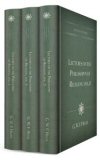
Hegel's Lectures on the Philosophy of Religion
- Author: G.W.F. Hegel
- Translators: E.B. Speirs and J. Burdon Sanderson
- Publisher: Kegal Paul, Trench, Trübner, & Co.
- Volumes: 3
- Pages: 1,077
Georg Wilhelm Friedrich Hegel is one of the most influential thinkers in modern philosophy. The Hegelian dialectic—the idea that truth is attained by synthesizing an idea (thesis) and its opposite (antithesis)—continues to dominate much of Western philosophy. In the dynamic process of the Hegelian dialectic, the two opposites are neither annihilated nor subsumed into each other. Rather, they’re integrated and united to form one new concept. This concept then becomes a thesis, which then develops an antithesis, and the dialectic continues. In Lectures on the Philosophy of Religion, Hegel applies this dialectic to the study of religion.
Georg Wilhelm Friedrich Hegel (1770–1831) was born in Stuttgart, Germany. He received his early education at the Gymnasium Illustre in Stuttgart. He entered the seminary at the University of Tubingen in 1788, graduating with a degree in theology. After graduating, Hegel tutored the children of an aristocratic family in Berlin. He left Berlin to lecture on logic and metaphysics at the university in Jena, becoming an Extraordinary Professor in 1805. Displaced by Napoleon’s campaign through Prussia, Hegel took the position of editor at a newspaper in Bamberg. In 1808, Hegel left Bamberg to become headmaster of a gymnasium in Nuremberg. In 1811, he married Marie Helena Susanna von Tucher, with whom he had two sons. Hegel briefly accepted a post at the University of Heidelberg before accepting the chair of philosophy at the University of Berlin, where he remained until his death.

Select Works of William James
- Author: William James
- Volumes: 8
- Pages: 2,468
Is life worth living? This question, the title of one of William James’ essays, is one James himself struggled with in his life and work. Trained as a doctor, James never practiced medicine. Perhaps due to his own struggles with depression and melancholy, he was drawn to philosophy and psychology. That interest turned into a serious academic career. Known as the father of American psychology, James is the founder of functional psychology and cofounder of the James-Lange Theory of Emotion. He also wrote an important work on the psychology of religious experience. James’ philosophical work forms some of the seminal thinking on pragmatism—the belief that usefulness, not truth, should be the focus of philosophical ideas.
Individual Titles:
- The Will to Believe, and Other Essays in Popular Philosophy
- Human Immortality: Two Supposed Objections to the Doctrine
- The Varieties of Religious Experience: A Study in Human Nature
- Pragmatism: A New Name for Some Old Ways of Thinking
- The Meaning of Truth: A Sequel to “Pragmatism”
- A Pluralistic Universe: Hibbert Lectures at Manchester College on the Present Situation in Philosophy
- Some Problems of Philosophy: A Beginning of an Introduction to Philosophy
- Essays in Radical Empiricism
William James (1842–1910) was born at the Astor House in New York City. His father, Henry James Sr., was a Swedenborgian theologian. His godfather was poet and philosopher Ralph Waldo Emerson. James studied science at Harvard University and enrolled in Harvard Medical School, earning an MD in 1869. In 1878, he married Alice Gibbens, and in 1882, he became a member of the theosophical society. James suffered various forms of depression throughout his life. Though he studied medicine, he was drawn to philosophy and psychology. He began writing on these subjects and eventually began teaching at Harvard. He held professorships of both philosophy and psychology, ending his career as emeritus professor of philosophy in 1907. Medical historians consider him the 14th most eminent psychologist of the twentieth century.

Select Works of John Dewey
- Author: John Dewey
- Volumes: 11
- Pages: 3,018
Along with Charles Sanders Peirce and William James, John Dewey is considered one of the central figures in American pragmatism. A philosophical tradition that continues to hold sway today, pragmatism identifies the usefulness and practical effect of belief as the proper focus of philosophy. Dewey initially considered himself a Hegelian, but later turned toward pragmatism as a result of James’ Principles of Psychology. The scope of Dewey’s interests, however, reflect Hegel’s influence. Dewey not only wrote about traditional philosophical subjects, but addressed topics such as art, education, culture, politics, and civil society. As a pragmatist, he considered these subjects under his rubric of “reconstruction,” the conviction that pragmatism represents a means of systematically reorienting philosophy from the “problems of philosophers” to “the problems of men.”
Individual Titles:
- Psychology
- Leibniz’s New Essays Concerning the Human Understanding
- The School and Society
- The Child and the Curriculum
- Studies in Logical Theory
- Moral Principle in Education
- How We Think
- Democracy and Education: An Introduction to the Philosophy of Education
- Essays in Experimental Logic
- Reconstruction in Philosophy
- Human Nature and Conduct: An Introduction to Social Psychology
John Dewey (1859–1952) was born in Burlington, Vermont. He studied philosophy at the University of Vermont and worked as a primary and secondary school teacher after graduation. After receiving private instruction in philosophy from a former professor, Henry A. P. Torrey, Dewey decided to pursue a career in philosophy, enrolling in doctoral studies at Johns Hopkins University. There he studied under Charles Sanders Peirce, receiving his doctorate in 1884. Dewey taught at the University of Michigan (1884–1894), University of Chicago (1894–1904), and University of Columbia from 1904 until his retirement in 1930. While teaching at the University of Chicago, Dewey’s thought became distinctly pragmatist in orientation. During his appointment at the University of Columbia, he embraced the role of public intellectual and social commentator, writing in magazines like The New Republic and engaging in political activism. He was elected president of the American Psychological Association in 1899, and president of the American Philosophical Association in 1905. He died in 1952 at the age of 92.
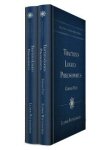
Tractatus Logico-Philosophicus
- Author: Ludwig Wittgenstein
- Publisher: Routledge & Kegan Paul
- Volumes: 2
- Pages: 208
What is the relationship between language and reality? That’s the question that Ludwig Wittgenstein attempted to answer in the seven propositions of his Tractatus Logico-Philosophicus. Begun while Wittgenstein was on the front lines of WWI and completed when he was a POW in an Italian prison camp, the Tractatus is the only book-length philosophical work published during Wittgenstein’s lifetime. The book had a major impact on the development of logical positivism, and Bertrand Russell’s Philosophy of Logical Atomism is a working out of Wittgenstein’s propositions.
The book contains seven main propositions, followed by a varying number of sub-propositions. The statements are intended to be self-evident; they are given no logical support or explanation. One of Wittgenstein’s overarching goals in the Tractatus is to show that much of philosophy is meaningless. He drives this home with the seventh propositon, which states, “Whereof one cannot speak, thereof one must be silent.”
Individual Titles:
- Tractatus Logico-Philosophicus translated by C.K. Ogden
- Tractatus Logico-Philosophicus: German Text
. . . the most perfect example I have ever known of genius as traditionally conceived, passionate, profound, intense, and dominating.
—Bertrand Russell
Ludwig Wittgenstein (1889–1951) was born in Vienna, Austria. His father, Karl Wittgenstein, was a wealthy art patron who commissioned works by Rodin. The family was very well connected with the European art world; Gustav Klimt painted Wittgenstein’ sister’s wedding portrait, and both Brahms and Mahler gave regular concerts for the family. All the Wittgenstein children were educated at home to prepare them for business. When he was 14, Wittgenstein attended the technical Realschule in Linz. In 1906, Wittgenstein studied engineering in Berlin, earning a diploma in 1908. From there, he went to Manchester to do doctoral studies in aeronautics. While in Manchester he developed a love for logic and mathematics and, at the suggestion of one of his friends, went to Cambridge to study with Bertrand Russell, who came to regard Wittgenstein as a true genius. In 1913, Wittgenstein moved to Norway, where he wrote his Logik. During WWI, Wittgenstein volunteered to serve on the front lines, where he wrote various notes that would eventually become the Tractatus. Following the war, Wittgenstein gave away his inheritance and enrolled in teacher training school. He eventually returned to Cambridge, where he submitted his Tractatus as his PhD dissertation and became a fellow of Trinity College. In 1939, Wittgenstein became the professor of philosophy at Cambridge and also, to escape the Nazis, a British citizen. During WWII, he served as a hospital porter in London under a pseudonym. He died of prostate cancer in 1951.
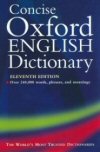
Concise Oxford English Dictionary, 11th Edition
- Editors: Catherine Soanes and Angus Stevenson
- Publisher: Oxford University Press
- Publication Date: 2004
- Pages: 1,728
Authoritative and up to date, this eleventh edition of the Concise Oxford English Dictionary contains over 240,000 words, phrases, and definitions, including 900 new words. It offers rich vocabulary coverage, with full treatment of World English, rare, historical, and archaic terms, as well as scientific and technical vocabulary, and provides hundreds of helpful notes on grammar and usage.
This mini-edition of a giant known as the OED claims to pack the authority of the original into a handy size ideal for use in schools, offices, and at home.
—Library Journal
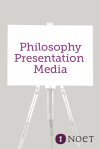
Noet Philosophy Presentation Media
- Publication Date: 2013
Noet Philosophy Presentation Media is a collection of timelines and quote slides for use as personal study tools or teaching aids. Add visual interest and key information to any philosophy presentation.